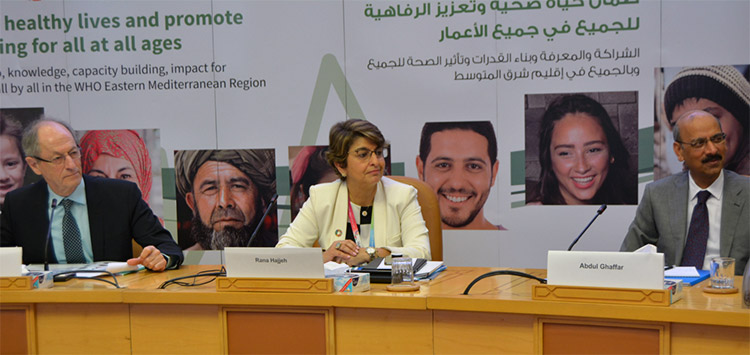
20 November 2019, Cairo, Egypt – The World Health Organization Regional Office for the Eastern Mediterranean is pleased to announce the establishment of a Commission on Social Determinants of Health to lead action on the social determinants of health in the Region with the aim of achieving health equity. It aims to establish a comprehensive evidence base of health inequities, the factors which drive such inequities and assess practical ways of addressing these within countries. The Commission is being jointly convened by the WHO Regional Office for the Eastern Mediterranean, the Alliance for Health Policy and Systems Research, Geneva, and the Institute of Health Equity at University College London.
In the Region, there are huge disparities in health outcomes, such as life expectancy and maternal and under-5 child mortality, between and within Member States. Fragility, referring to a wide array of situations, including countries in conflict or those experiencing humanitarian or natural crises, is an additional determinant of health in many countries of WHO’s Eastern Mediterranean Region. The Commission aims to analyse, document and evaluate these health inequalities, in addition to providing evidence-based, action-oriented recommendations to contribute to the implementation of WHO’s regional Vision 2023, which outlines WHO’s work with countries of the Region for the next four years. The work of the Commission is also expected to contribute to strengthening support to countries in implementation of WHO’s Thirteenth General Programme of Work and to accelerate progress towards achievement of the 2030 Sustainable Development Goals.
The Commission is being chaired by Professor Sir Michael Marmot of the Institute of Health Equity at University College London, and comprises regional and global experts from various sectors. Sir Michael Marmot, a globally renowned figure on health equity, said that the establishment of the Commission demonstrated the great determination of the WHO Regional Director for the Eastern Mediterranean Dr Ahmed Al-Mandhari and Member States to reduce avoidable health inequalities, which, as in other WHO regions, blight the lives of so many. “Health inequalities are not only the result of unequal access to health care, but they arise from inequities in the conditions in which people are born, grow, live, work and age. The Commission will build on the work of the Global Commission on the Social Determinants of Health and that of the commissions established by the WHO Regional Office for Europe and Pan American Health Organization, whose findings additionally contributed to building evidence and supporting prioritization and action on health inequalities. It is expected that the Commission on Social Determinants of Health for the Eastern Mediterranean Region will build knowledge, capacity and ambition on the social determinants of health inequalities and support additional regions, Member States and stakeholders to take action.”
Dr Al-Mandhari, in previous dialogues with policy-makers and stakeholders at various fora, has stated that the huge disparities in income both within and between countries, coupled with significant social, economic and technological disparities, had greatly affected the status of health in Member States of the Region. He reiterated the importance of attaining a greater understanding of the causes of health inequities and identifying where the solutions may lie to ensure that WHO, governments and partner organizations can more effectively address inequities in order to ultimately fulfil their commitments made under the 2030 Agenda for Sustainable Development and achieve the goal of Health for All by All as outlined in WHO’s Vision 2023.



